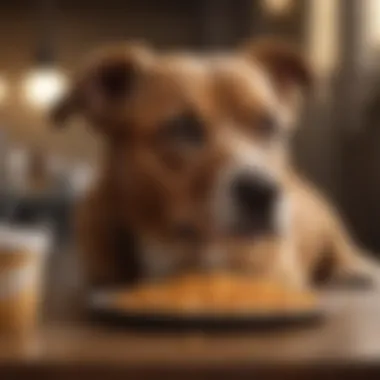Feeding a Dog with Diarrhea: Key Insights for Owners


Intro
Diarrhea in dogs can be a challenging issue for pet owners. Understanding the causes and implications of gastrointestinal distress is crucial. This guide aims to inform pet owners on how to effectively feed and manage their dogs during this uncomfortable period. It encompasses dietary modifications, hydration importance, and signs that warrant veterinary attention. By equipping pet owners with knowledge, we can improve our dogs' health outcomes.
Understanding Your Pet
Recognizing the Signs of Diarrhea
To address diarrhea effectively, recognizing its onset is vital. Common symptoms include unusual stool consistency and frequency of bowel movements. Sometimes, additional signs may arise, like lethargy or vomiting, and these may indicate a more severe issue. Early intervention is essential.
Quick Tips: Observe your dog's behavior and note any changes.
Breed Traits
Different dog breeds react uniquely to diet and health issues. For instance, some breeds are more prone to digestive disorders. Understanding these breed-specific traits can guide feeding adjustments during diarrhea.
Common Temperaments
Temperament can influence how a dog responds to illness. Dogs with anxious or nervous personalities may react poorly to dietary changes. Maintaining a calm environment during this time can ease stress.
Special Needs
Some dogs may have specific health needs due to age or pre-existing conditions. These factors require owners to tailor dietary adjustments to meet their dog's unique requirements. Consulting a vet can clarify any doubts regarding special feeding considerations.
Nutrition and Feeding Guidelines
Proper nutrition plays a critical role in recovery from diarrhea. The right diet can help restore normal bowel function and ensure your dog receives essential nutrients.
Suggested Diet for Dogs with Diarrhea
- Bland Foods: Boiled rice and plain boiled chicken are ideal. These foods are gentle on the stomach.
- Pumpkin: Plain canned pumpkin can help firm up stools due to its fiber content.
- Probiotics: Products like yogurt may help restore healthy gut flora.
- Hydration: Ensuring your dog is hydrated is crucial. Offer fresh water frequently.
Foods to Avoid
Some foods can exacerbate diarrhea and should be avoided:
- Fatty or greasy foods
- Spicy seasonings
- Dairy products (if lactose intolerant)
The Role of Hydration
Dehydration can occur rapidly with diarrhea. Dogs must have access to fresh water at all times. In severe cases, electrolyte solutions formulated for pets may be necessary. Hydration aids digestion and helps maintain overall health.
Recognizing When to Seek Veterinary Help
It's important to know when to consult a veterinarian. Seek attention if:
- Diarrhea persists for more than 24 hours.
- There is blood in the stool.
- Vomiting accompanies diarrhea.
- Signs of lethargy or discomfort are present.
Monitoring Your Dog's Health
Regularly observing your dog's health can provide insights into their recovery. Look for:
- Improvement in stool consistency
- Increased energy levels
- Normal feeding behavior returning
Best Practices for Recovery
When managing a dog with diarrhea, consider these best practices:
- Gradual Diet Transition: Introduce new foods slowly as your dog recovers.
- Smaller, Frequent Meals: Feed smaller portions more often to ease digestion.
- Routine Veterinary Check-Ups: Regular visits help maintain overall health and prevent future issues.
Understanding Diarrhea in Dogs
Diarrhea is a common issue in dogs, yet it can indicate various health problems. Understanding its nature is essential for effective management. This section aims to shed light on the definition of diarrhea and its common causes, helping pet owners make informed choices regarding their dog's health.
Definition of Diarrhea
Diarrhea in dogs is characterized by an increase in the frequency of bowel movements, coupled with a change in the consistency of feces. It can manifest as loose, watery stools and may occur alongside other symptoms. Recognizing this condition early facilitates prompt action, making it a necessary focus in understanding your dog's health.


Common Causes of Diarrhea
Many factors can contribute to diarrhea in dogs. Understanding these causes is critical for effective treatment.
Dietary indiscretion
Dietary indiscretion refers to the consumption of inappropriate or excessive foods. This can occur when a dog eats trash, spoiled food, or foods that are rich in fat. The immediate effect can lead to gastrointestinal upset, resulting in diarrhea. The key characteristic of dietary indiscretion is its preventability; pet owners can control what their dogs consume. However, it is beneficial to monitor what your dog accesses, as it reduces the likelihood of diarrhea caused by accidental ingestion of harmful substances.
Infections
Infections, whether viral, bacterial, or fungal, can lead to diarrhea in dogs. A common example includes parvovirus, which affects young puppies severely. The key aspect of infections is their contagious nature, which can spread among animals. Preventative measures, such as vaccinations and avoiding exposure to sick dogs, are crucial. The unique feature of infections is that they typically require veterinary intervention to address the root cause and any complications arising.
Parasites
Parasites, such as giardia or roundworms, can also cause diarrhea in dogs. They invade the digestive system, leading to nutrient absorption issues and gastrointestinal distress. The primary characteristic of parasites is that they can be transmitted through contaminated food or water. Regular deworming and maintaining good hygiene can mitigate this risk. However, parasites may demand a more cautious approach when observed, as they can lead to severe illness if left untreated.
Underlying health conditions
Underlying health conditions, including issues such as pancreatitis, liver disease, or inflammatory bowel disease, may result in persistent diarrhea. Identifying these conditions is essential, as they may be indicative of severe health concerns. The key characteristic of such conditions is that they often require medical treatment and long-term management plans. Regular veterinary check-ups are necessary to monitor your dog’s health and prevent complications.
Recognizing the specific cause of diarrhea is vital in determining the appropriate treatment and dietary approach to ensure your dog’s swift recovery.
Assessing Your Dog's Condition
Assessing your dog's condition is a crucial step in managing diarrhea effectively. Understanding how severe the situation is can help you determine the best path forward. Diarrhea in dogs can be a sign of a mild issue, such as dietary indiscretion, or it may indicate a more serious underlying health problem. By examining the symptoms and duration of diarrhea, you can make informed decisions regarding treatment and when to seek professional help.
Symptoms Accompanying Diarrhea
Vomiting
Vomiting is often a symptom that accompanies diarrhea. It can signal that the dog’s gastrointestinal tract is struggling to process food effectively. Recognizing this symptom is important as it may suggest a more significant health concern, particularly when it occurs frequently. While not every episode of vomiting is alarming, multiple occurrences alongside diarrhea can lead to dehydration or more serious complications. Monitoring your dog for this symptom allows you to take preventative measures before the situation escalates. Being attentive to vomiting can help you in assessing your dog’s overall health during this troubling time.
Lethargy
Lethargy refers to decreased energy and activity levels. When a dog with diarrhea becomes lethargic, it can indicate discomfort, pain, or dehydration. Recognizing lethargy can prompt you to act quickly. A dog that is usually active but is now sluggish may require immediate attention. It is essential to observe this key characteristic closely. An increase in lethargy can signify a worsening condition, which is why it is a notable aspect when assessing your dog's health during this period.
Fever
Fever is another symptom that can accompany diarrhea. An elevated body temperature may indicate an underlying infection or inflammation. This can exacerbate the effects of diarrhea, necessitating closer observation. If your dog feels warmer than usual, it may be worth investigating further. Such a symptom can be vital in assessing the severity of your dog's condition. Always consider consulting a veterinarian if a fever is present, as it can significantly affect your dog’s ability to recover.
Dehydration
Dehydration is a significant risk associated with diarrhea. Dogs lose vital fluids during episodes, leading to potential health complications. Recognizing signs of dehydration—such as dry gums, excessive thirst, or sunken eyes—is crucial for your dog's recovery. Dehydration can severely affect your dog’s overall well-being and may require medical intervention to restore fluid balance. Assessing your dog for this symptom enables you to act promptly, ensuring their health is protected during illness.
Duration of Diarrhea
The duration of diarrhea plays a vital role in determining the necessary course of action. Diarrhea lasting more than a day or two can be a sign of a more significant health issue. Tracking how long your dog has been experiencing diarrhea is essential for assessing the need for veterinary care. If the diarrhea is persistent, it deserves evaluation. Understanding duration in conjunction with other symptoms can provide deeper insights into your dog's condition and facilitate informed decision-making regarding their health.
Nutritional Considerations During Diarrhea
Understanding the right nutrition during a dog's bout with diarrhea is vital for recovery and overall health. Dogs can lose essential nutrients and hydration when they have diarrhea. Therefore, it is crucial to provide appropriate dietary changes that can assist in their recovery. Effective nutritional support can help restore normal bowel function and prevent further complications.
Importance of Hydration
Hydration plays a significant role during this time. Diarrhea can lead to substantial fluid loss, which may cause dehydration. Keeping your dog hydrated is essential. Water is the best choice, but sometimes dogs may need electrolytes for recovery. Offering fresh water frequently can help maintain hydration levels. Observing urine color and frequency is a good practice; dark urine often indicates dehydration.
Foods to Offer
Several foods can promote recovery and are gentle on the digestive system. Here are some effective options:
Plain Rice
Plain rice is a common go-to for dogs recovering from diarrhea. Its primary characteristic is its blandness, which helps avoid further irritation of the stomach. It is easy to digest and can firm up loose stool by providing a binding effect. When boiled and offered in small portions, it can be a beneficial choice. However, plain rice lacks some nutrients, which is why it should not form the only part of the diet.
Boiled Chicken
Boiled chicken is another favorable option. It has a high protein content while being easy on the stomach. Removing skin and bones is essential to make it more digestible. The benefits include providing essential nutrients without the heaviness of fatty meats. However, it's important to balance this with other ingredients since only chicken may not provide a complete diet.


Pumpkin
Pumpkin is known for its fiber content, which can be helpful in regulating digestion. Offering pure canned pumpkin rather than spiced varieties can help absorb excess water in the intestines. It is rich in vitamins and can stimulate healthy bowel movements. While pumpkin is generally safe, excessive amounts might lead to digestive upset, so moderation is key.
Probiotics
Probiotics are live bacteria that contribute positively to gut health. They can help restore the normal gut flora disrupted by diarrhea. You can find specific probiotic supplements designed for dogs. These can improve digestive health and reinforce the immune system. However, consult with a veterinarian before introducing these, especially if your dog is on medication or has underlying health issues.
Foods to Avoid
Not all foods are beneficial during diarrhea. Some foods can exacerbate the condition and should be strictly avoided:
Dairy Products
Dairy products are often difficult for dogs to digest, especially when they are already experiencing gastrointestinal distress. While some dogs may tolerate small amounts of yogurt, others may experience further diarrhea. It is best to avoid all dairy until the dog's digestive health returns to normal.
Fatty Foods
Fatty foods can lead to additional digestive issues. High fat content requires more effort to digest, which can worsen diarrhea. Foods like bacon or greasy meats should be avoided during recovery periods to prevent exacerbation of symptoms.
Spicy Foods
Spicy foods can irritate a dog’s sensitive digestive tract. Even a small amount of spice can trigger a negative reaction, so it is wise to keep spicing out of their diet entirely during this time. Generally, dogs do not have the digestive enzymes to handle spicy ingredients.
High-Fiber Foods
Though fiber is crucial for digestive health, high-fiber foods can further irritate a dog’s stomach during diarrhea. Foods like beans, whole grains, and some raw vegetables can cause bloating and additional gastrointestinal distress. It is better to stick with low-fiber options during recovery.
Overall, understanding nutritional considerations during a dog's diarrhea can lead to better management of their condition. Choosing the right foods while maintaining hydration can significantly contribute to the recovery process. By avoiding problematic foods, pet owners can ensure a smoother return to health.
Feeding Guidelines During Diarrhea
In managing diarrhea in dogs, the nutritional approach is critical. Proper feeding guidelines assist in supporting recovery while minimizing stress on the digestive system. Adjustments in diet can help stabilize the dog's condition and ensure it receives essential nutrients without causing further gastrointestinal discomfort.
Frequency of Feeding
Offering food to a dog with diarrhea requires careful consideration of feeding intervals. It is generally advised to feed smaller meals more frequently rather than a few large ones. This method helps reduce the burden on the digestive system and allows the dog's body to process food more effectively during recovery.
- Initial Interval: In the beginning, giving food every 4 to 6 hours can be beneficial. This allows time for digestion without overwhelming the system.
- Adjustments: As the dog's condition improves, gradually move to a more standard schedule, such as every 8 to 12 hours. Monitor your dog's response and adjust accordingly.
Feeding frequency impacts how well a dog can recover from diarrhea. Offering small, controlled portions reduces the likelihood of further gastrointestinal upset, ultimately aiding in the healing process.
Portion Control
Controlling portion sizes is another essential aspect of feeding a dog with diarrhea. During this time, it is prudent to offer smaller portions that contribute to gradual recovery while ensuring adequate nutrition. This helps to avoid overloading the digestive tract.
- Initial Portion Size: Start with about one-quarter of the dog's usual food quantity. This allows the dog to eat comfortably without triggering more diarrhea.
- Monitoring Response: Keep an eye on the dog's reaction to the food. If symptoms worsen, it may be necessary to reduce the portion further or reconsider the type of food being offered.
- Gradual Increase: If the dog tolerates the food well and begins to improve, incrementally increase the portion size over several days until reaching a normal feeding amount.
Remember, sustaining good hydration is equally important as controlling food intake. Water should always be available to keep your dog well-hydrated.
Overall, implementing these feeding guidelines promotes a more manageable recovery process for dogs suffering from diarrhea. These strategies reduce the likelihood of recurring symptoms and help ensure the pet receives proper nutrition during a delicate time.
When to Seek Veterinary Help
Knowing when to seek veterinary help is essential when a dog is suffering from diarrhea. While diarrhea can be a common issue with various non-serious causes, it can also signal a more serious health concern. Recognizing the right time to consult with a veterinarian can prevent complications and ensure your dog receives the appropriate care.
Signs of Dehydration
Dehydration is a significant risk for dogs suffering from diarrhea. Dogs can lose fluids quickly, especially if diarrhea persists without the intake of sufficient water. Some notable signs of dehydration include:
- Dry gums and tongue: Healthy dogs will have moist, pink gums. If they appear dry or sticky, it can indicate dehydration.
- Loss of skin elasticity: Gently pinching the skin on the back of the neck can show how hydrated your dog is. If the skin does not return quickly to its normal position, it may be a sign of dehydration.
- Lethargy: Unusual tiredness or weakness can suggest not enough fluids.
- Increased thirst: A dog may drink more water than usual if they are dehydrated. This can also be a sign that they are trying to compensate for lost fluids.
If you observe these symptoms in your dog, it's vital to consult a veterinarian. They can assess the level of dehydration and recommend appropriate treatment.
Persistent Symptoms
If diarrhea lasts more than a day or two, or if it is accompanied by other warning signs, this may indicate a more serious underlying condition. Some persistent symptoms to monitor include:


- Continuous vomiting: If your dog is repeatedly vomiting, this can further complicate hydration efforts and indicates a need for medical attention.
- Fever: An elevated body temperature can be a sign of infection or other health issues that need addressing.
- Blood in stool: The presence of blood, whether fresh or dark, is a serious indicator requiring immediate veterinary intervention.
- Loss of appetite: A dog that refuses to eat for an extended period may be in greater distress, warranting a visit to the veterinarian.
- Behavior changes: If your dog becomes unusually anxious, aggressive, or withdrawn, this can also be a sign of discomfort or pain.
Taking your dog's health seriously and seeking veterinary help as needed can lead to timely treatment. Always err on the side of caution when your pet's wellbeing is at stake.
Post-Recovery Feeding Practices
After a period of diarrhea, it is crucial to adopt effective feeding practices to support your dog's recovery. This phase can often determine how well the digestive system will adjust back to its normal function. Proper feeding post-recovery also aids in restoring energy levels and ensures that your dog does not develop food aversions or further gastrointestinal issues.
Gradual Reintroduction of Regular Diet
Once your dog shows signs of recovery from diarrhea, such as more solid stools and increased energy, it's time to think about reintroducing their regular diet. This must be done gradually to avoid overwhelming their sensitive digestive system.
Begin by mixing a small portion of their regular food with the bland diet you have been providing. For example, if your dog has been eating boiled chicken and plain rice, start with a mixture of a quarter of regular food combined with three-quarters of the bland diet. Observe your dog for any signs of discomfort or recurrence of diarrhea.
Typically, you can increase the proportion of regular food over several days. A suggested timeline is as follows:
- Day 1-2: 25% regular food and 75% bland diet
- Day 3-4: 50% regular food and 50% bland diet
- Day 5-6: 75% regular food and 25% bland diet
- Day 7 and beyond: 100% regular diet if no symptoms return
This gradual approach helps monitor your dog’s reaction to the food. In any case where symptoms reappear, revert to the bland diet and consult with a veterinarian.
Monitoring for Recurrence
During this post-recovery phase, vigilant monitoring is necessary. Watch for potential signs of a recurrence of diarrhea or other gastrointestinal issues. Key symptoms to keep an eye out for include:
- Loose stools or diarrhea
- Changes in appetite
- Vomiting
- Lethargy or decreased activity
Keeping a close watch will allow you to address any issues promptly. If the symptoms persist or worsen, it is paramount to seek veterinary assistance. Your vet can help identify any underlying issues and suggest dietary adjustments or other treatments.
Maintaining a consistent feeding schedule also supports recovery. Giving your dog meals at the same time each day can help stabilize digestion and establish routine. Furthermore, consider maintaining a food diary to track what combinations your dog tolerates well during this sensitive stage.
Important: Avoid rushing the process. Quick changes can lead to stress on the digestive system and serve to prolong recovery.
Long-Term Dietary Management
Long-term dietary management is a vital aspect of sustaining your dog’s health, especially following episodes of diarrhea. After a bout of digestive troubles, it is crucial to reassess the dog's diet for both recovery and prevention of future issues. This section highlights the importance of carefully curating your dog’s nutrition and understanding the implications of long-term dietary choices.
Identifying Food Allergies
One of the first steps in effective long-term dietary management is to identify any potential food allergies your dog may have. Dogs can develop intolerances or allergies to certain ingredients, which may lead to gastrointestinal disturbances such as diarrhea. Common allergens include beef, chicken, dairy products, and grains. Deliberately monitoring your dog's reaction to different foods can help you pinpoint problematic ingredients.
To identify food allergies, consider the following steps:
- Keep a food diary: Note what your dog eats and any symptoms that arise.
- Elimination diets: Remove suspected allergens one at a time and observe any changes.
- Consult a veterinarian: A vet can offer advice and may recommend specific tests to confirm allergies.
Understanding what your dog can and cannot eat not only aids in resolving diarrhea but also contributes to their overall wellbeing in the long term.
Importance of a Balanced Diet
A balanced diet is essential for every dog’s health. It ensures that they receive all necessary nutrients for energy and proper functioning. Dogs require proteins, fats, carbohydrates, vitamins, and minerals in precise ratios. Since diarrhea can lead to nutrient loss, it’s crucial to replenish what your dog needs in their recovery phase and beyond.
Key benefits of maintaining a balanced diet:
- Enhanced immune function: Good nutrition supports a strong immune system.
- Optimal weight maintenance: Helps in regulating body weight and preventing obesity.
- Better digestion: Promotes a healthy digestive system, reducing the risk of gastrointestinal issues.
Owners should aim to provide high-quality commercial dog foods or carefully formulated homemade meals that cater to their dog’s specific health needs. Reading labels and ensuring proper portion sizes are also fundamental to achieving a balanced approach to long-term feeding.
Keeping a keen eye on nutrition can drastically improve your dog's quality of life.
Ending
In concluding this article, it is critical to recognize the significance of understanding how to properly feed a dog suffering from diarrhea. This matter affects not only the dog's immediate health but also long-term well-being. Proper management can prevent further health complications. Thus, a mindful approach in dietary choices is essential.
Key elements to consider involve not just hydration and suitable food choices but also monitoring signs that indicate the need for veterinary assistance. The ability to identify symptoms that accompany diarrhea can prompt timely actions. For example, if a dog is lethargic or showing signs of dehydration, these are flags for potential health risks.
Benefits of a well-structured feeding regimen during diarrhea include enhanced recovery and stabilization of digestive health. Employing bland diets such as boiled chicken or pumpkin can often lead to improvements. Furthermore, reintroducing regular food too quickly can lead to recurrence of symptoms. Hence, gradual transitions are advisable.
Additionally, engaging in long-term dietary management, including the identification of food allergies and maintaining a balanced diet, ensures that pets do not experience future incidents of diarrhea. In this way, awareness and informed decision-making can greatly improve the overall quality of life for dogs.
By addressing every aspect related to feeding during diarrhea, pet owners equip themselves with the knowledge necessary for better health management.
Summary of Key Points
- Understanding diarrhea in dogs is vital to providing appropriate care.
- Hydration plays a crucial role during episodes of diarrhea.
- Suitable food choices can facilitate recovery and improve digestion.
- Monitoring symptoms helps determine when veterinary help is necessary.
- Long-term management can prevent future digestive issues.
This holistic understanding fosters a more informed approach in caring for pets, ensuring their health is prioritized effectively.



